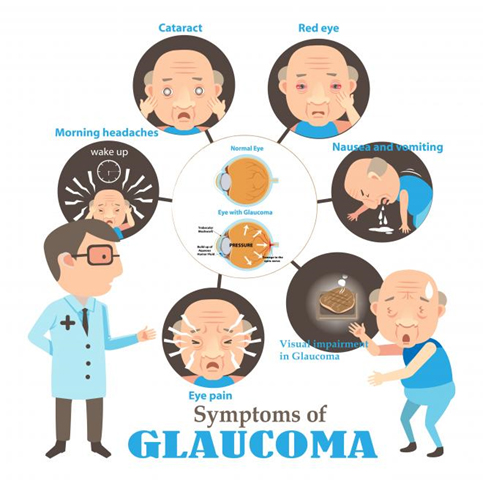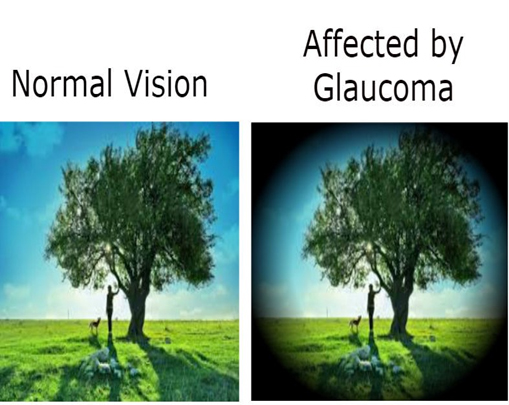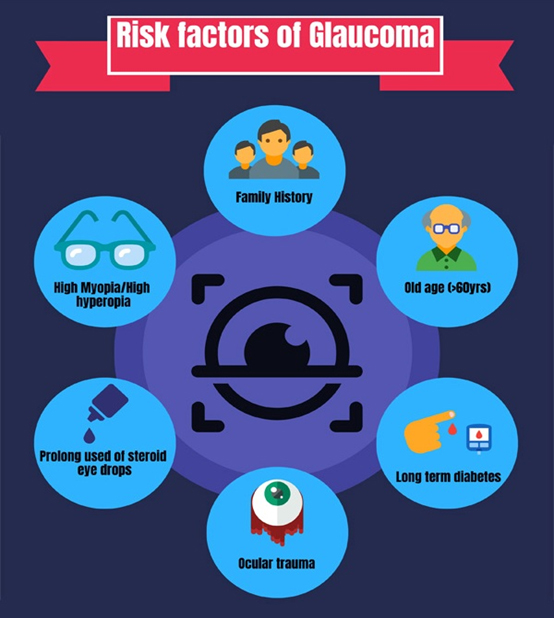Glaucoma

What are Glaucoma?
Glaucoma is a group of eye diseases that can cause vision loss and blindness by damaging a nerve in the back of your eye called the optic nerve.
The symptoms can start so slowly that you may not notice them. The only way to find out if you have glaucoma is to get a comprehensive dilated eye exam.
There's no cure for glaucoma, but early treatment can often stop the damage and protect your vision.
What are the types of Glaucoma?
There are many different types of glaucoma, but the most common type in the United States is called open-angle glaucoma — that's what most people mean when they talk about glaucoma. Other types of glaucoma are less common, like angle-closure glaucoma and congenital glaucoma.


What are the symptoms of Glaucoma?
At first, glaucoma doesn't usually have any symptoms. That's why half of people with glaucoma don't even know they have it.
Over time, you may slowly lose vision, usually starting with your side (peripheral) vision — especially the part of your vision that's closest to your nose. Because it happens so slowly, many people can't tell that their vision is changing, especially at first.
But as the disease gets worse, you may start to notice that you can't see things off to the side anymore.
Without treatment, glaucoma can eventually cause blindness.
When to get help right away?
Angle-closure glaucoma can cause these sudden symptoms:
Intense eye pain
Upset stomach (nausea)
Red eye
Blurry vision
If you have these symptoms, go to your doctor or an emergency room now.
Am I at risk for Glaucoma?
Anyone can get glaucoma, but some people are at higher risk. You're at higher risk if you:
• Have Family history
• Are over age 60
• Are African American or Hispanic/Latino and over age 40
• Have long standing diabetes
• Have used steroids for long time
• High refractive error
• Any injury to eye
Talk with your doctor about your risk for glaucoma, and ask how often you need to get checked.
What causes Glaucoma?
Scientists aren't sure what causes the most common types of glaucoma, but many people with glaucoma have high eye pressure (intraocular pressure) — and treatments that lower eye pressure help to slow the disease.
There's no way to prevent glaucoma. That's why eye exams are so important — so you and your doctor can find it before it affects your vision
How will my eye doctor check for Glaucoma?
Eye doctors can check for glaucoma as part of a comprehensive dilated eye exam. The exam is simple and painless — your doctor will give you some eye drops to dilate (widen) your pupil and then check your eyes for glaucoma and other eye problems. The exam includes a visual field test to check your peripheral (side) vision.
How will my eye doctor check for cataracts?
An eye doctor can check for cataracts as part of a dilated eye exam. The exam is simple and painless — your doctor will give you some eye drops to dilate (widen) your pupil and then check your eyes for cataracts and other eye problems

